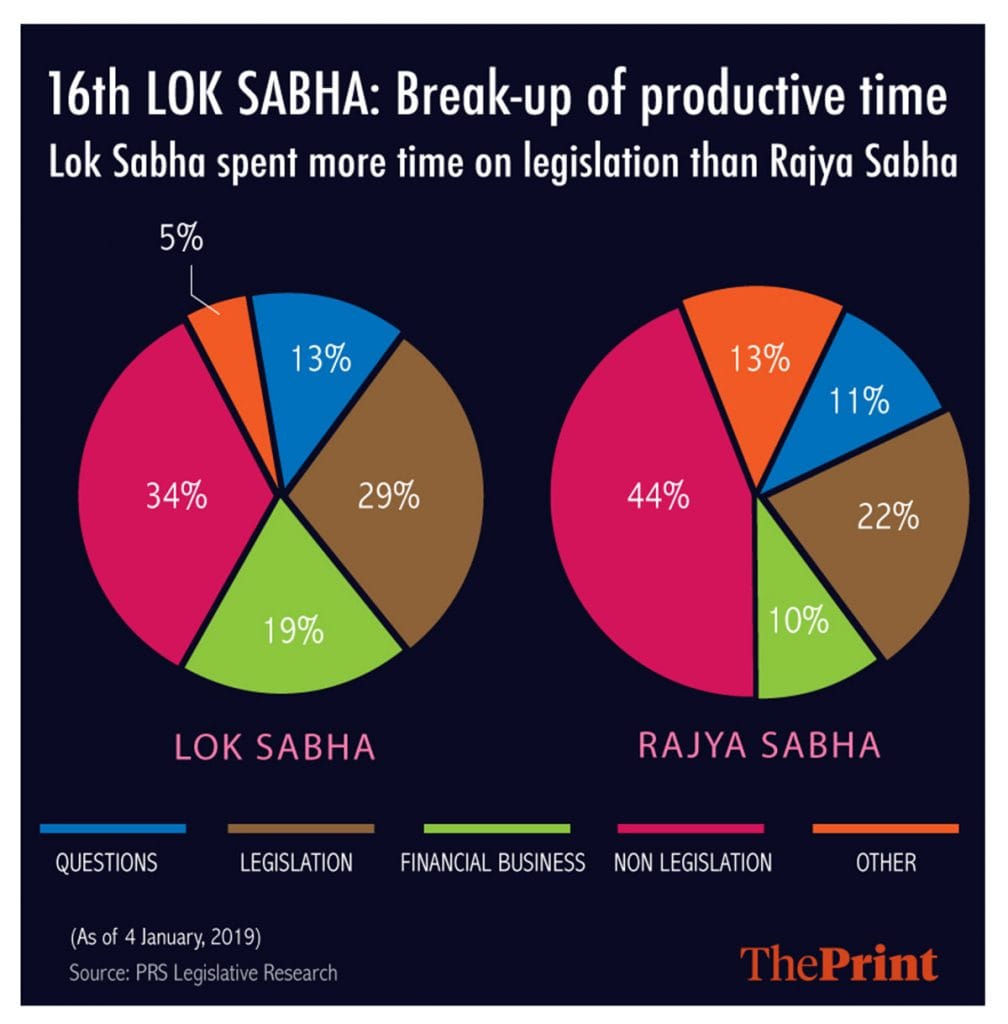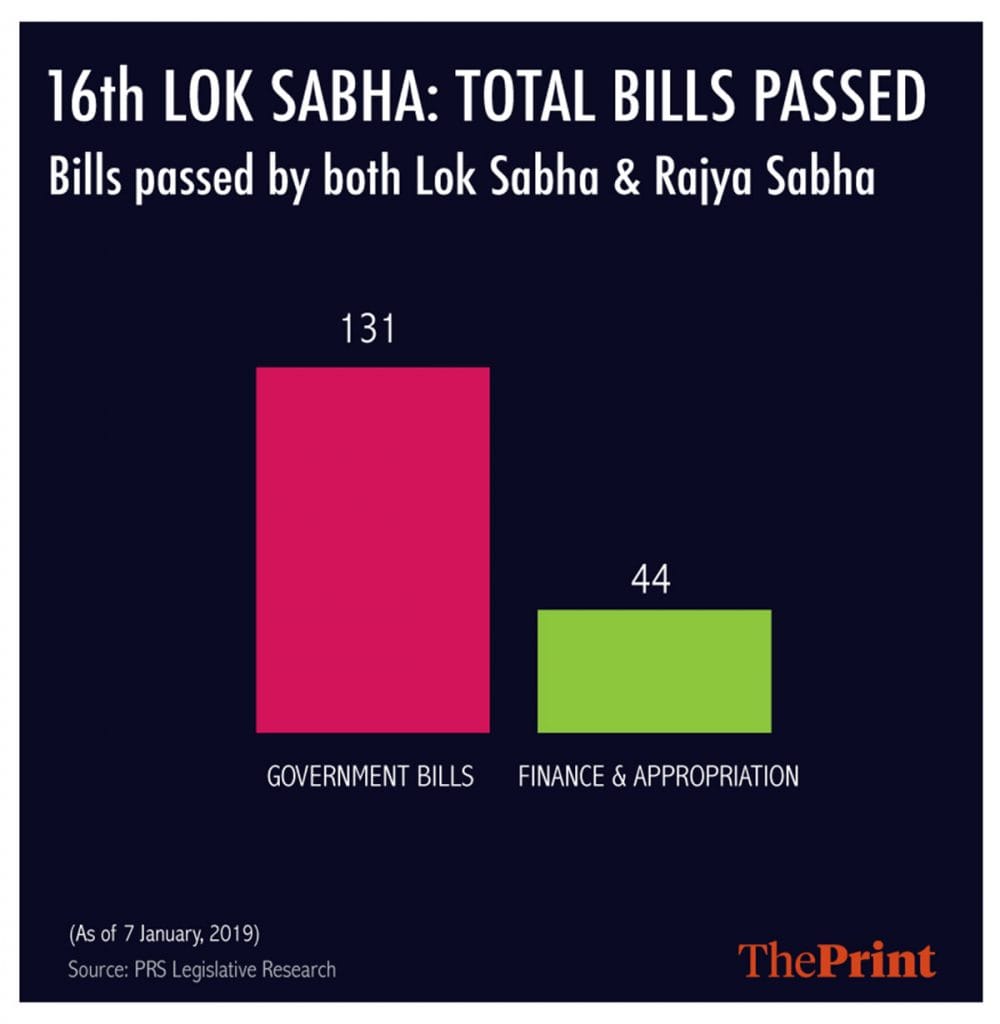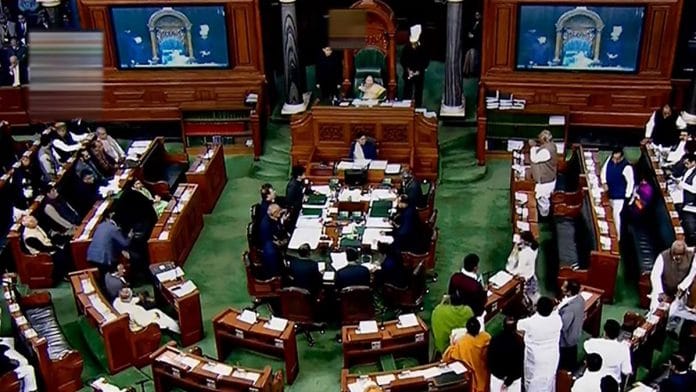The current Lok Sabha has sent far fewer bills to parliamentary committees than the previous two houses.
That our Parliament is dysfunctional is stating the obvious. The blame for the abysmally low productivity of Parliament during the just-concluded Winter Session should not just be placed on political parties. In a democracy, the onus lies equally on us who vote to elect representatives to the House, directly to the Lok Sabha and indirectly to the Rajya Sabha.
This Winter Session, which began on 11 December and ended 8 January, the Lok Sabha worked for just 46 per cent of its scheduled time. Members of Parliament (MPs) spoke along expected party lines, whips were strongly enforced, the standard of debate deteriorated, and the discourse—particularly of leaders from the ruling party, and especially its ministers—seemed more like a series of election speeches aimed at voters.
Party leaders seldom made worthy points. With such abject lack of conduct, Parliament is losing much of its sheen.
Ask yourself a simple question: When was the last time you considered the performance of your elected representatives—be it MPs or MLAs—while voting for them again in the elections?
The answer may not make you very proud.

Also read: Lok Sabha far more productive during PM Modi’s 5 years than Manmohan Singh’s UPA-2
Hurried action
On the last day of the session, the Lok Sabha managed to pass one bill after the other—the Constitutional Amendment Bill that grants 10 per cent reservation in education and jobs to the economically weaker upper castes; the Transgender Persons (Protection of Rights) Bill, 2018, the Surrogacy (Regulation) Bill, 2018; the Consumer Protection Bill, 2018; the National Trust for Welfare of Persons with Autism, Cerebral Palsy, Mental Retardation and Multiple Disabilities (Amendment) Bill, 2018.
The Lok Sabha also passed the Muslim Women (Protection of Rights on Marriage) Bill, 2018; the Indian Medical Council (Amendment) Bill, 2018; the Companies (Amendment) Bill, 2018; the Aadhaar and Other Laws (Amendment); the DNA Technology (Use and Application) Regulation Bill, 2018 and the Citizenship (Amendment) Bill, 2019, among others.
Besides discussing and passing these key bills on the final day of the session, the Lok Sabha held a detailed discussion on the Rafale deal that lasted eight hours and 21 minutes, as well as another on natural calamities in parts of the country.
The latter could not be completed owing to the lack of time.
Also read: In Photos | MPs in Parliament for the extended winter session of Rajya Sabha
Numbers say it all
According to PRS Legislative Research, of the 20 scheduled sittings, only 17 were held and a record 49 MPs were suspended for five sittings—for wilfully disturbing the proceedings.
Another interesting factoid emerged in PRS’s findings: the Lok Sabha had to be adjourned earlier than its scheduled time on 14 of the 17 days. Why? Because our MPs caused interruptions.
The situation was no better in the Rajya Sabha.
Even though it met for an extra day to enable the elders to pass the Constitution Amendment Bill, it spent just 26 per cent of its time productively.
The Rajya Sabha was adjourned before the scheduled time on 16 out of the 18 days.
So far so bad.

There’s more: the current Lok Sabha has sent far fewer bills to various parliamentary committees than the previous two houses.
While the 15th Lok Sabha sent 71 per cent of the bills to standing committees for inputs, the current Lok Sabha has sent just 26 per cent—one reason why more Bills have been introduced and passed in the same session.
Also read: How 3 bills violate the rights of the very people they seek to empower
Dismal record
Of the three pillars of democracy, Parliament is the most connected with the people—after all, we elect MPs. However, if they don’t perform or don’t devote adequate time to fulfil what citizens elected them for, the faith of the people in the institution itself is shaken.
Are our MPs, for example, holding the government accountable for its decisions and scrutinising them closely?
While there have been several suggestions that the Lok Sabha and the Rajya Sabha meet for 120 and 100 days respectively, the actual number of sittings is staggeringly poor.
The National Commission to Review the Working of the Constitution offered several suggestions on how to improve the functioning of our legislatures, including state assemblies. But, nothing seems to have been done to implement the recommendations.
With the general elections less than four months away, and a truncated session scheduled before them, there isn’t much opportunity for improvement.
And so, we must wait for yet another election for our Parliament to turn over a new leaf.







The talk about Rafale is not likely to stop anytime soon. Just as in the case of Bofors, the discussions/protests go on even today, though JPC and judiciary explorations did not reveal any wrongdoing. In the case of Rafale, no investigative process has even been attempted as yet. In such a situation it is likely that the parliamentarians will not stop at raising the issue only 50% of the time. Similarly for other instances, when they believe they deserve to be heard but are being shouted down by the majority party.
Think of MPs – like MLAs in the states – as docile sheep, herded at will by the party whip. There are reports that 50 sitting MPs from UP will be denied tickets. It is not really that there is anti incumbency against them. They play no role in governance, count for next to nothing in the overall scheme of things. The only difference is that it will not be possible to get lampposts elected this time round. Had each MP been an effective building block of power, things would have been different.